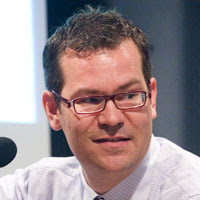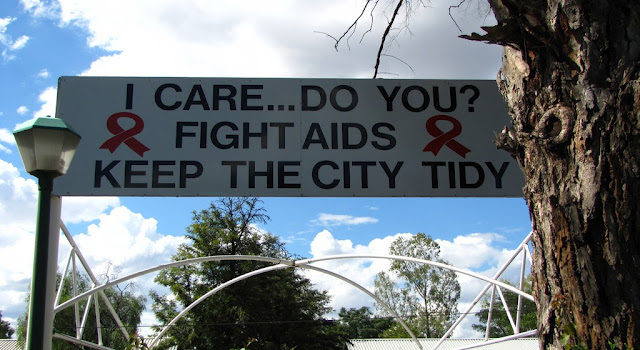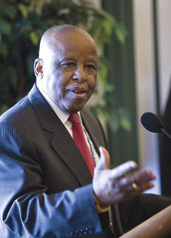Showing posts by Wilson Center Staff.
-
ECSP Seeking Interns for Spring 2011
›November 23, 2010 // By Wilson Center StaffApply today by sending cover letter, resume, and writing sample to ecsp@wilsoncenter.org.
The Environmental Change and Security Program is seeking interns to:- Write for our award-winning blog
- Network with leading experts in the environment, population, and security fields
- Work closely with the friendly, dynamic “Green Team” to explore new media while seeking a sustainable future
Assignments may include:- Drafting posts for The New Security Beat and ECSP’s website
- Assisting with events and conferences
- Researching environment, population, and security information
- Assisting the preparation of publications and/or outreach materials
- Updating contact databases
- Performing administrative assignments in support of ECSP activities
Potential interns should be students and/or recent graduates with an interest in, coursework related to, and/or experience working on environmental and human security.
In addition, applicants should:- Possess strong research, writing, and/or administrative skills
- Be detail-oriented
- Be able to work both independently and as part of a group
- Be enrolled in a degree program, recently graduated (within the last year), and/or have been accepted to enter an advanced degree program within the next year
How to Apply
To apply, please submit a resume, cover letter, and short writing sample (between two and five pages in length). Please indicate in your cover letter whether you are applying for a paid or unpaid internship.
Please submit application via e-mail to ecsp@wilsoncenter.org with “Spring 2011 Internship” in the subject line.
The deadline is rolling. Applications will be accepted until the position is filled. Due to the high volume of resumes ECSP receives, only those candidates selected for interviews will be contacted. -
Robert Walker on Family Planning Promotion and Global Population Growth
› “Expanding voluntary family planning access and ensuring that all women have access to reproductive health services is, to me at least, a no brainer,” said the Population Institute’s Robert Walker in this interview with ECSP. “I think it’s a win for women, for their health, for their welfare, the welfare of their families, for their communities, for the environment, and for the planet at large.”
“Expanding voluntary family planning access and ensuring that all women have access to reproductive health services is, to me at least, a no brainer,” said the Population Institute’s Robert Walker in this interview with ECSP. “I think it’s a win for women, for their health, for their welfare, the welfare of their families, for their communities, for the environment, and for the planet at large.”
While China and India dominate much of the global headlines about population growth, other parts of South Asia – namely Afghanistan and Pakistan – and sub-Saharan Africa receive comparatively little attention. For Walker, a renewed global effort to boost the quality and quantity of reproductive healthcare tools and services in these areas of the developing world is essential.
“This is very, very doable. We face a lot of really incredible challenges in the world today, particularly with respect to food, energy, water, and poverty. But if we can increase what we spend on international family planning assistance by three or four billion dollars a year, we can literally change the world,” Walker said. “And I think we desperately need to.”
The “Pop Audio” series is also available as podcasts on iTunes. -
Colin Kahl on Demography, Scarcity, and the “Intervening Variables” of Conflict
› “One of the major lessons of 9/11 is that even superpowers can be vulnerable to the grievances emanating from failed and failing states,” said Colin Kahl, now deputy assistant secretary of defense for the Middle East, at an ECSP event at the Wilson Center in October 2007. However, “if poverty and inequality were enough to lead to widespread civil strife, the entire world would be on fire.”
“One of the major lessons of 9/11 is that even superpowers can be vulnerable to the grievances emanating from failed and failing states,” said Colin Kahl, now deputy assistant secretary of defense for the Middle East, at an ECSP event at the Wilson Center in October 2007. However, “if poverty and inequality were enough to lead to widespread civil strife, the entire world would be on fire.”
“I think any in-depth examination of particular cases shows that there’s a complex interaction between demographic pressures, environmental degradation and scarcity, and structural and economic scarcities – that they tend to interact and reinforce one another in a kind of vicious circle,” Kahl said.
“It’s really important to keep in mind that any attempt to address…environmental and demographic factors should focus not just on preventing environmental degradation, or slowing population growth, or increasing public health. They must also focus on those intervening variables in the middle that make certain societies and countries more resilient in the face of crisis.”
The “Pop Audio” series is also available as podcasts on iTunes. -
Former Botswana President Champions Health, Governance Issues
›November 16, 2010 // By Wilson Center StaffOriginally featured in the Scholar Spotlight, Centerpoint, November 2010.
His Excellency Festus Mogae, who served as president of Botswana from 1998–2008, recently spent several months at the Wilson Center as a public policy scholar. During his stay, he conducted research, networked with senior policy officials in the U.S. government, the United Nations, and with NGO representatives in Washington and New York, and attended Wilson Center seminars related to health and governance.
Since leaving office, Mogae has advocated for governance reform in Africa, notably presidential term limits, and efforts to mitigate the effects of climate change. Another critical initiative he is pursuing actively is HIV/AIDS prevention across Africa.
Mogae is the founder and chairman of Champions for an HIV-Free Generation, a group that assists current African presidents in dealing with the AIDS pandemic. This year, the delegation visited South Africa, Namibia, Mozambique, and Swaziland and, most recently, Zambia in October. The group seeks policy and attitude changes among the leaders of these nations and also advocates for increased financing for AIDS prevention in their health budgets. “If [these countries] allocate their own resources, the donor agencies will see they are serious about this problem” and match funds, said Mogae.
“We take the view that a more outspoken leadership must come from the continent regarding the AIDS epidemic,” he said. “African leaders must not only care but also be seen by donor countries and agencies as leading from the front on these matters.”
The group includes Mozambique’s Joaquim Chissano, Tanzania’s Benjamin Mkapa, Zambia’s first president Kenneth Kaunda, former Vice President of Uganda Speciosa Wandira, and former Chairperson of Kenya’s National AIDS Control Council, Miriam Were. Also in the coalition are two notables from South Africa, Nobel Laureate Archbishop Desmond Tutu and Constitutional Court judge, Justice Edwin Cameron.
The Champions coordinate with local health representatives based in Africa, from UNAIDS, the World Health Organization, PEPFAR, and the Gates Foundation, which prepare country reports on the status of AIDS. Then, armed with this research, the group meets with African leaders, including the presidents, finance and health ministers, local government and parliamentary officials, private sector, union, and civil society representatives, and church groups to lobby for policy changes.
“We highlight success stories on the continent so others can emulate them,” Mogae said. “We are calling for social behavioral change, but that can only happen if advocated and led by the top religious and traditional leadership.”
One particular challenge has been mother-to-child transmissions. He said in sub-Saharan Africa, in 2000, 40 percent of children born to HIV-positive mothers got infected but by 2008, the figure was down to three percent. The target is zero, he said.
Another major initiative chaired by Mogae is the Coalition for Dialogue on Africa, or, CoDA, a joint venture among the African Development Bank, the African Union Commission, and the UN Economic Commission for Africa. This global effort focuses on education, agriculture and conservation, energy and natural resources, and helping women. CoDA currently is organizing a symposium on women’s empowerment, he said, that will focus on education, and reforming land ownership and marriage laws.
These and other organizations with which he is affiliated aim to help shape policies and set priorities for Africa. He said, “We can’t ask the international community for help unless we first help ourselves.”
Dana Steinberg is the editor of the Wilson Center’s Centerpoint.
Photo Credit: AIDS sign in Gaborone, Botswana, courtesy of flickr user cordelia_persen. -
Yale Environment 360: ‘When The Water Ends: Africa’s Climate Conflicts’
›November 10, 2010 // By Wilson Center StaffOriginally posted on Yale Environment 360:
For thousands of years, nomadic herdsmen have roamed the harsh, semi-arid lowlands that stretch across 80 percent of Kenya and 60 percent of Ethiopia. Descendants of the oldest tribal societies in the world, they survive thanks to the animals they raise and the crops they grow, their travels determined by the search for water and grazing lands.These herdsmen have long been accustomed to adapting to a changing environment. But in recent years, they have faced challenges unlike any in living memory: As temperatures in the region have risen and water supplies have dwindled, the pastoralists have had to range more widely in search of suitable water and land. That search has brought tribal groups in Ethiopia and Kenya in increasing conflict, as pastoral communities kill each other over water and grass.
When the Water Ends, a 16-minute video produced by Yale Environment 360 in collaboration with MediaStorm, tells the story of this conflict and of the increasingly dire drought conditions facing parts of East Africa. To report this video, Evan Abramson, a 32-year-old photographer and videographer, spent two months in the region early this year, living among the herding communities. He returned with a tale that many climate scientists say will be increasingly common in the 21st century and beyond — how worsening drought in parts of Africa, the Middle East, and elsewhere will pit group against group, nation against nation. As one UN official told Abramson, the clashes between Kenyan and Ethiopian pastoralists represent “some of the world’s first climate-change conflicts.”
But the story recounted in When the Water Ends is not only about climate change. It’s also about how deforestation and land degradation — due in large part to population pressures — are exacting a toll on impoverished farmers and nomads as the earth grows ever more barren.
The video focuses on four groups of pastoralists — the Turkana of Kenya and the Dassanech, Nyangatom, and Mursi of Ethiopia — who are among the more than two dozen tribes whose lives and culture depend on the waters of the Omo River and the body of water into which it flows, Lake Turkana. For the past 40 years at least, Lake Turkana has steadily shrunk because of increased evaporation from higher temperatures and a steady reduction in the flow of the Omo due to less rainfall, increased diversion of water for irrigation, and upstream dam projects. As the lake has diminished, it has disappeared altogether from Ethiopian territory and retreated south into Kenya. The Dassanech people have followed the water, and in doing so have come into direct conflict with the Turkana of Kenya.
The result has been cross-border raids in which members of both groups kill each other, raid livestock, and torch huts. Many people in both tribes have been left without their traditional livelihoods and survive thanks to food aid from nonprofit organizations and the UN.
The future for the tribes of the Omo-Turkana basin looks bleak. Temperatures in the region have risen by about 2 degrees F since 1960. Droughts are occurring with a frequency and intensity not seen in recent memory. Areas once prone to drought every ten or eleven years are now experiencing a drought every two or three. Scientists say temperatures could well rise an additional 2 to 5 degrees F by 2060, which will almost certainly lead to even drier conditions in large parts of East Africa.
In addition, the Ethiopian government is building a dam on the upper Omo River — the largest hydropower project in sub-Saharan Africa — that will hold back water and prevent the river’s annual flood cycles, upon which more than 500,000 tribesmen in Ethiopia and 300,000 in Kenya depend for cultivation, grazing, and fishing.
The herdsmen who speak in this video are caught up in forces over which they have no real control. Although they have done almost nothing to generate the greenhouse gas emissions that cause global warming, they may already be among its first casualties. “I am really beaten by hunger,” says one elderly, rail-thin Nyangatom tribesman. “There is famine — people are dying here. This happened since the Turkana and the Kenyans started fighting with us. We fight over grazing lands. There is no peace at all.”
Watch When the Water Ends: Africa’s Climate Conflicts on Yale Environment 360.
For more on integrated PHE development and the Horn of Africa, see “The Beat on the Ground: Video: Population, Health, and Environment in Ethiopia” and “As Somalia Sinks, Neighbors Face a Fight to Stay Afloat,” on The New Security Beat. -
John Bongaarts on the Impacts of Demographic Change in the Developing World
› “The UN projects about 9.1 billion people by 2050, and then population growth will likely level off around 9.5 billion later in the century. Can the planet handle 9 billion? The answer is probably yes. Is it a desirable trajectory? The answer is no,” said John Bongaarts, vice president of the Policy Research Division at the Population Council, in this interview with ECSP.
“The UN projects about 9.1 billion people by 2050, and then population growth will likely level off around 9.5 billion later in the century. Can the planet handle 9 billion? The answer is probably yes. Is it a desirable trajectory? The answer is no,” said John Bongaarts, vice president of the Policy Research Division at the Population Council, in this interview with ECSP.
Although family planning was largely brushed aside by international policymakers following the 1994 UN International Conference on Population and Development in Cairo, Bongaarts said he is hopeful because it is now enjoying a higher profile globally – and receiving greater funding.
“I am optimistic about the understanding now, both in developing and developed world, and in the donor community, that [family planning] is an important issue that should be getting more attention,” Bongaarts said. “And therefore I think the chances of ending up with a positive demographic outlook are now larger than they were a few years ago.”
The “Pop Audio” series is also available as podcasts on iTunes. -
Tamara Kreinin on Women’s Empowerment, Population Growth, and Sustainability
› “We know that when that when we empower women – whether it’s giving them control over their bodies and access to family planning or whether it’s by including them in planning around climate change – their agency can make huge leaps for us,” said Tamara Kreinin, executive director of women and population at the UN Foundation, in this interview with ECSP.
“We know that when that when we empower women – whether it’s giving them control over their bodies and access to family planning or whether it’s by including them in planning around climate change – their agency can make huge leaps for us,” said Tamara Kreinin, executive director of women and population at the UN Foundation, in this interview with ECSP.
Seventy percent of the world’s poor are women and they’re also the members of the household most likely to be responsible for food, water, and firewood collection.
“At the same time, we know that women are often not at the table,” she said. “They’re not at the table in country when countries are creating aid to adaptation strategies around the environment and climate change, and they’re not at the table at places like Copenhagen and some of the big climate change meetings.”
The “Pop Audio” series is also available as podcasts on iTunes. -
Top 10 Posts for October 2010
›Nathan Yaffe and Laura Dismore’s post on a Ethiopian land-grab case study, Marc Levy’s response to Halvard Buhaug, and India and China’s thirst for resources topped the list last month:
1. The Beat on the Ground: Ethiopian Case Study Illustrates Shortcomings of “Land Grab” Debate
2. On the Beat: Climate-Security Linkages Lost in Translation
3. India’s Maoists: South Asia’s “Other” Insurgency
4. U.S. v. China: The Global Battle for Hearts, Minds, and Resources
5. VIDEO: Peter Gleick on Peak Water
6. Brian O’Neill: Population Is Neither a Silver Bullet Nor a Red Herring in Climate Problem
7. DRC’s Conflict Minerals: Can U.S. Law Impact the Violence?
8. On the Beat: New Study Finds Lower Population Growth Could Cut Carbon Emissions, Lead Author Presents at SEJ 2010
9. Latin America’s Future: Emerging Trends in Economic Growth and Environmental Protection
10. Welcome Back, Roger-Mark: A Powerful Voice Returns to PHE












